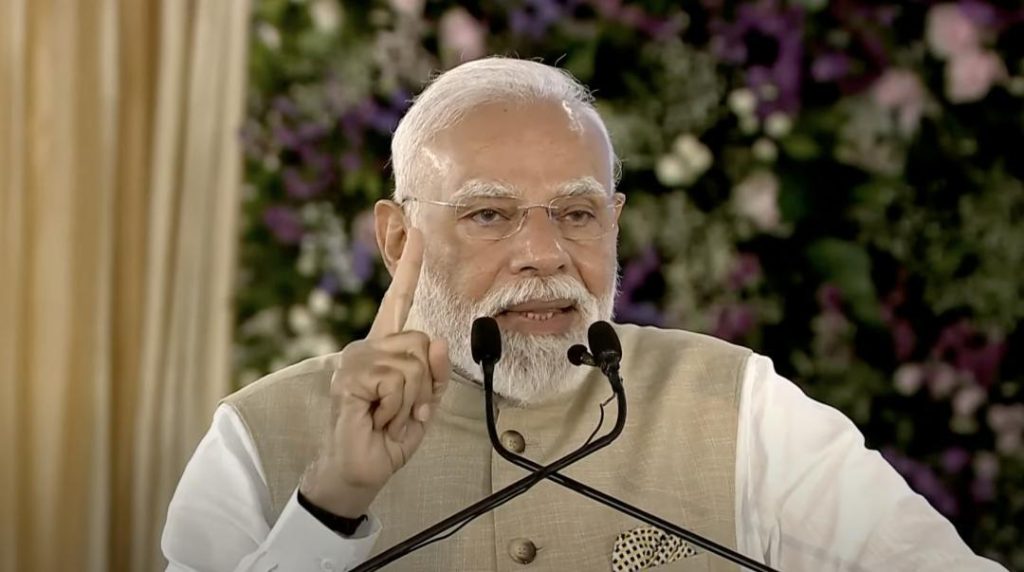
Don’t Care if Investment is in Dollars or Pounds, Sweat Should be of Indians: PM Modi
Prime Minister Narendra Modi’s vision for a self-reliant India has been reiterated time and again, and his recent statement during a visit to Gujarat has further emphasized his commitment to the cause. Speaking at the inauguration of a plant on Tuesday, PM Modi delivered a clarion call to the nation, redefining his concept of ‘swadeshi’ in the process.
“My definition of swadeshi is very simple,” the Prime Minister stated. “I’m not concerned about whose money is being invested. I’m not worried whether it’s dollars or pounds or whether the currency is black or white. However, when it comes to production, the sweat should be of Indians.”
This statement has sparked a wave of interest and debate across the nation, with many interpreting it as a call to action for Indians to take ownership of the country’s production and manufacturing sectors. In an era where foreign investments are increasingly playing a significant role in India’s economic growth, PM Modi’s words serve as a reminder that true self-reliance can only be achieved when Indians are actively involved in the production process.
The concept of swadeshi is not new to India, and it has been a cornerstone of the country’s self-reliance movement for decades. However, PM Modi’s emphasis on the importance of Indian sweat in production is a departure from the traditional understanding of swadeshi, which often focused on the use of local materials and labor.
In the past, the swadeshi movement was often criticized for being isolationist and protectionist, with many arguing that it hindered India’s economic growth by restricting foreign trade and investment. However, PM Modi’s statement suggests that the new definition of swadeshi is more nuanced and focused on the active involvement of Indians in the production process, rather than simply using local materials and labor.
This shift in focus is significant, as it acknowledges the reality of globalized trade and investment, while also emphasizing the importance of Indian participation in the production process. By doing so, PM Modi is sending a clear message to foreign investors and multinational corporations that while their investments are welcome, the sweat and toil that goes into producing goods and services should be that of Indians.
So, what does this mean for India’s economic future? In the short term, it is likely to lead to a increase in domestic production and manufacturing, as Indian companies and entrepreneurs take on more responsibility for producing goods and services. This could lead to a reduction in reliance on imports and a boost to the country’s balance of payments.
In the long term, PM Modi’s emphasis on Indian sweat in production could lead to the development of a more robust and self-sufficient manufacturing sector, capable of producing high-quality goods and services that can compete with the best in the world. This, in turn, could lead to increased job creation, improved economic growth, and a reduction in income inequality.
However, there are also potential challenges and risks associated with PM Modi’s statement. For instance, it could lead to a backlash from foreign investors and multinational corporations, who may feel that their interests are being marginalized. It could also lead to a increase in protectionist sentiment, with some calling for restrictions on foreign trade and investment in the name of protecting Indian industries.
Furthermore, PM Modi’s statement may also be seen as a form of economic nationalism, which could have negative consequences for India’s relations with other countries. In an increasingly interconnected world, economic nationalism can lead to trade wars and a reduction in global economic cooperation, which could have far-reaching consequences for India’s economic growth and development.
In conclusion, PM Modi’s statement on swadeshi is a significant development in India’s economic landscape, and its implications will be far-reaching. While it may lead to a increase in domestic production and manufacturing, it also raises important questions about the role of foreign investment and the balance between economic growth and self-reliance.
As the nation grapples with the implications of PM Modi’s statement, it is essential to strike a balance between promoting domestic production and manufacturing, while also ensuring that foreign investment is welcome and encouraged. By doing so, India can achieve its goal of becoming a self-reliant nation, while also maintaining its position as a key player in the global economy.
Source: https://youtu.be/72bw-OL5Eio






